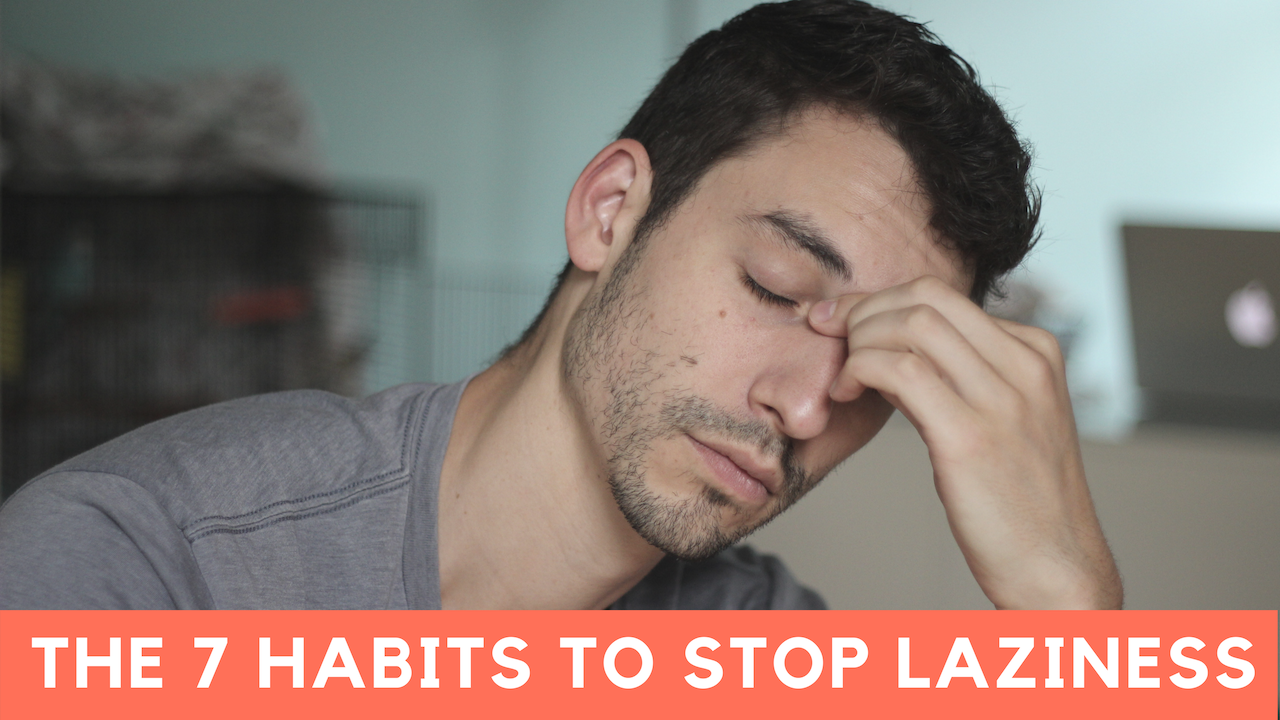
Too Damn Lazy to Workout or Do Anything? Do this.

When you want to get results, it seems logical to try and do everything, right? But what if you’re still not getting the outcome that you want?
Or the results are not coming as quickly as you would hope?
In today’s article, we’re going to talk about how you can actually crush some of the laziness you’re feeling when you’re not getting results. Maybe you’ve gone the first 25% and have seen some results, but you’re still far away from where you’d like to be.
The Shortcut to Speeding up Weight Loss & Fitness Results
First – Look At What’s Going on With Your Self-Identity
I’ve shot so many videos on laziness, and the thing I’ve realized is that, fundamentally, laziness begins with the narrative that we tell to ourselves,
“I’m lazy.”
If this keeps cropping up, you have to nail down what’s beginning internally – a story. The reason is that if you describe yourself as lazy, it becomes your self-identity.
I’ve shared Dr. Maxwell Maltz’s philosophy on the self-identity, and since then, it’s become an almost obsession in my own life.
Why the obsession? Because if we don’t believe we can do something, we’re not even going to bother trying it.
When it comes to the self-identity with laziness, sometimes we say, “I am just a lazy person.” Chances are, if you are 20 or 25, you already know if you are “a lazy person.” Maybe your mom or teacher said it, maybe a friend told you so, or maybe you say it to yourself.
The most important thing to begin with is the invisible – the narrative. Since our physical actions are just a continuation of our thoughts, if our thoughts don’t change, then nothing about our actions will.
Ask Yourself Byron Katie’s Four Questions

Laziness is not something that you’re born with. It can be changed. The very first thing is to understand the narrative surrounding laziness.
According to Byron Katie, not all the suffering that goes on inside our heads is the reality. Oftentimes, we tend to torture ourselves by exaggerating our situations.
But what if we break down each negative thought? It’s likely that our situation wouldn’t seem as bad as we thought. Byron Katie uses a Four Question approach to defeat the negative thoughts in our heads:
Question #1: Is it true?
First, ask yourself this: Are you actually a lazy person all the time? Are you lazy when it comes to school, work, hanging out with your boyfriend or girlfriend, playing the video game you like, or going to the movies with your friends?
Are you lazy during all of those events? Probably not, right? It’s probably just when you’re doing key certain things, so the first thing is, is it true all the time?
Question #2 How do you really know that it is true?
You say that you’re a lazy person. Well, show me some proof that it’s true. Now, maybe you’ll say, “All right, I know I’m supposed to do that one gym work out, I didn’t do it.
I know I was supposed to take care of my homework or my work, I didn’t get it done.” Well, two times you were lazy. What about the other times, though?
Think about the bigger picture, all of those myriad things that have been going on. And if you thought you were truly lazy in every single instance, you’re probably going to find that you weren’t.
Question #3: How does it make you feel?
How do you feel when you call yourself lazy? You’ll probably say, “I feel like a piece of crap, depressed, unhappy, self-loathing, like I’m not going to get anywhere.” How do you react then when you feel that way?
Question #4: Where would you be/Who would you be without that narrative?
This question is the real gangbuster. If you did not believe you were lazy—that you were actually the most ambitious, motivated, and productive person you knew—who would you be?
What would your life look like?
This is the part where you start thinking about the possibility of changing all the aspects of your life that might have already changed if you weren’t lazy.
We can use different tactics and strategies, but if we don’t fundamentally change who we are (our past experiences, beliefs, mindsets, and cultural nuances), nothing matters.
It’s the same reason why entrepreneurs, kids in sports, and people in relationships don’t succeed. It’s because of an inner mindset.
Getting Clear on What Your Micro Rituals Are

Finally, you need to get clear on your daily rituals and habits.
One thing I’ve noticed is that when my goals and daily rituals are unclear, it manifests as laziness. How are you going to get home from work at seven or eight, and then have the energy to cook and go to the gym…if you don’t have a plan?
When I first started working out, I would get home at 5:30 from work. I didn’t have a workout plan. I didn’t even know where the gym was, what I was going to do or what I was supposed to eat.
So when I got home, I was like,
“Okay, what workout should I do? What am I supposed to eat after? Where do I even go to do these? Do I do it at home? Can I do body weight? Do I have to have weights to get the results I want?”
Because I had all these missing pieces, it took a massive amount of energy to actually get anything done. I actually wasn’t lazy. I was just unfocused about what my daily rituals and habits should be to help me realize those goals.
The thing is that, sometimes we feel like we’re lazy, but in reality we’re not clear on the daily rituals.
When you need to go to the gym but are already tired, what usually goes through your mind? Do you think about what to eat, what workout to do, where you should go, and what time you should do it?
All of those require motivation, energy and focus. And all of those become little energy zappers if you’re not already prepared.
But if you have your workout on paper—or any task for that matter—you’re going to be ready no matter the time of the day.
It’s not going to be as draining as if you’re just showing up and trying to wing it, and come up with the plan all at once and do the workout.
Your “Master the Day” Habit for Today

With chronic laziness, the first thing that I’ve seen triggers it is, like everything, a story.
I’m so lazy.
I’m a lazy person.
The first step should always be to address that inner narrative, the story that you’re telling yourself.
Try to prove to yourself that it’s not always true. Come up and be clear on your daily rituals and your daily habits. Once those daily rituals are clear and you’ve removed all that friction to begin, it’s going to be a heck of a lot easier for you to get started.
Let me know: What’s keeping you from getting the results that you want? Do you describe yourself as lazy? Why?
-Alex

This is so crucial. I remember the doctor who confirmed I had herniated discs looking at me with this “I believe you understand how serious this is and I really dont know what its going to take to get you moving everyday so you dont end up with nerve damage” look. Beleive me i felt stupid enough for ignoring the pain all these years and even after a year of being diagnosed. But this is it. My internal narritive was off. Still struggling. Lost 20lbs. Still not active enough every day.